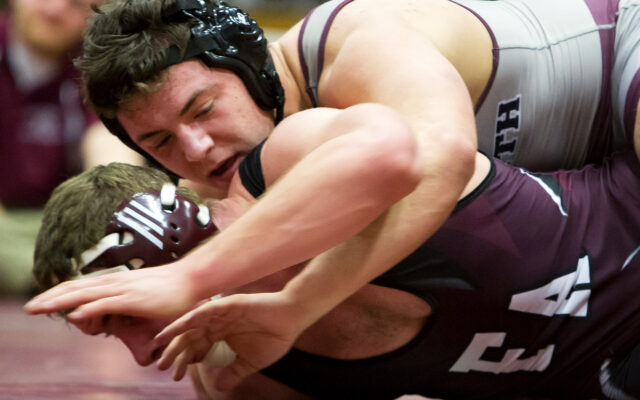
There aren’t enough referees for Maine high school wrestling
By Ernie Clark, Bangor Daily News Staff
If and how high school wrestling will return after being sidelined last winter due to COVID-19 remains to be determined.
But the sport’s return to Maine mats faces another significant obstacle beyond the pandemic: a lack of officials.
Fewer than 20 wrestling referees statewide have committed to working meets during the upcoming season, down approximately 30 percent from two years ago. That’s not enough to cover meets around the state under the current schedule, and puts a second wrestling season in jeopardy after student-athletes lost last year to the pandemic.
Shawn Guest, a long-time official and officials’ liaison to the Maine Principals’ Association’s wrestling committee, said that as of last week just 17 officials were available for meets this winter, with only 13 available on both traditional days for matches Wednesdays and Saturdays.
Typically, a Wednesday night requires around 20 to 27 officials statewide, said Jon Gallant, the state’s officiating assigner for high school wrestling.
“Like most organizations we’re extremely shorthanded for officials,” Gallant said. “We are an older association with a lot of experienced guys who have been around for a long time and we’ve struggled to attract new members.”
Gallant doesn’t believe the current shortage stems from the pandemic itself.
“I don’t think we lost anybody because of COVID,” he said. “I’m in my 22nd year and I was at a point where I was thinking I was ready to move along and the year away actually did the opposite and made me want to officiate more.”
Two reasons for the wrestling official shortage are similar to those affecting other sports in Maine and around the country — verbal abuse from coaches and fans, and job conflicts.
“There’s no hiding out on the mat,” said Guest, who has officiated wrestling matches for 40 years. “I don’t want to say you’re the center of attention but you’re right there, and I think a lot of kids see how some coaches act in the corners where they’re all over the officials and say, ‘I’m not going to put myself in that situation.’”
The shortfall has been exacerbated by life amid COVID-19, mostly in the difficulty of attracting newcomers to the part-time vocation because of all the jobs available.
“I think it’s tied together with a lot of the additional work that’s available because of the COVID situation,” Gallant said. “Some of the younger officials have jumped on that and taken some different jobs.”
Guest said the officiating community had a successful recruiting effort two years ago, but with last season canceled all but one of the 12 recruits in 2019 opted not to continue this year.
“We lost 11 new officials last year alone,” Guest said. “That was a huge hit because we’d been recruiting these kids and trying to get them in, and they were actually pretty darned good officials.”
It’s unlikely at this point that the current officials will be able to add significantly to their ranks to help cover the 2021-22 season, meaning school officials may have to rely on the scheduling creativity they’ve already used to guide their athletic programs through the fall season amid ongoing officiating shortages in other sports.
“A lot of schools have gotten through the lack of officials in the fall and have gotten very good at being flexible with their dates,” Gallant said. “I coach football down here and every week there are a number of games that are moved from Friday to Saturday or Friday to Thursday because of officials.”
Scheduling revisions are similarly one option for wrestling, from staging meets on additional nights of the week to holding more large, multi-team events on Saturdays.
Such revisions, particularly during the week, may be trickier during the winter because of the access required to indoor venues and given that multiple basketball teams at each school get much of the available gym time for practices and games on other weekdays.
“The issue becomes that gyms have to work around basketball,” Maine commissioner of officials Jeff Benson said. “That’s not to say that it can’t be done, because the ADs have been so great at being creative and getting things in where they need to get them in.”
But relying on a small pool of officials — many in their 50s and 60s — to handle the demands of overseeing a physical sport without having enough time to recover between matches could have other complications.
“The implications are that wrestling’s been a traditional Wednesday and Saturday schedule,” MPA Assistant Executive Director Mike Bisson said. “Now they may be wrestling every day of the week just to get matches in with only 16 or so officials, and if we do that are we going to burn those officials out?”
With their sport awaiting a decision on its immediate future for this winter, members of the wrestling community merely hope they will have a chance to determine how best to deal with the officiating dilemma in the coming weeks.
Winter sports preseason practices are scheduled to start on Nov. 22, with regular-season competition to begin Dec. 10.
“If we don’t have a season that would all but end wrestling except for a handful of schools, so that just can’t happen,” Gallant said.
“But I think we’ll be OK. I think we’re going to have a season.”